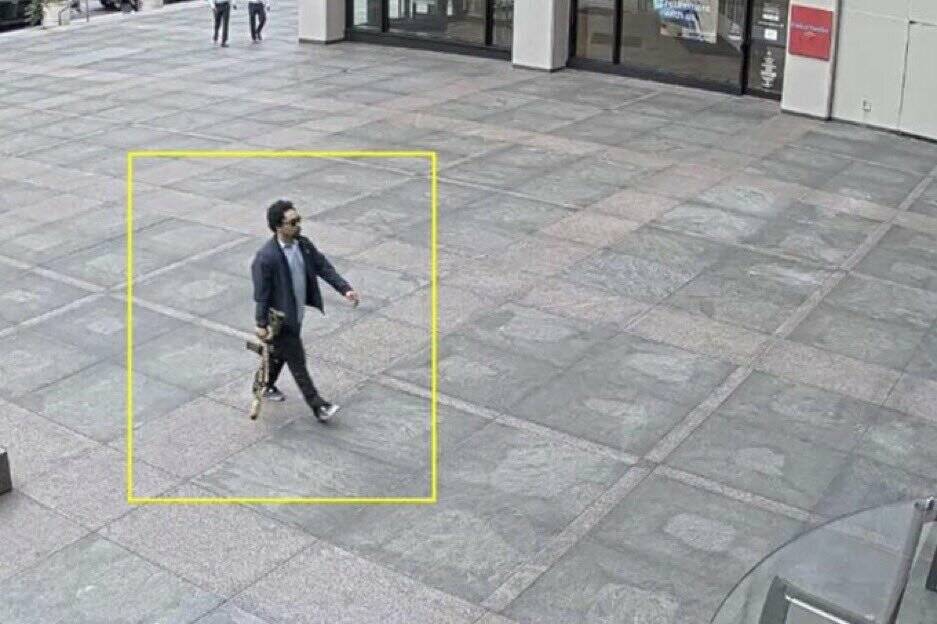NYC gunman’s background check not completed, red flag law not used
A national gun violence prevention group said Thursday that Nevada’s red flag law could have been used to limit Las Vegas resident Shane Tamura’s access to a firearm before he fatally shot four people in Manhattan last week.
Tamura had twice been placed on a mental health hold by police officers, who were aware that he possessed a firearm, according to records provided by the Metropolitan Police Department.
Nevada’s red flag law, passed in 2019 after the country’s deadliest mass shooting occurred on the Strip in 2017, permits a member of law enforcement or a family member to seek from the court a high-risk protection order to temporarily bar a person at risk to themself or others from possessing or purchasing a firearm.
“That didn’t happen here, and the result, unfortunately, is a tragedy,” Nick Suplina, senior vice president for law and policy at Everytown for Gun Safety, said in an interview.
The Manhattan tragedy is the “archetypal case” for why the under-used law was created, he said.
In a related development, a Nevada public safety agency told the Las Vegas Review-Journal that a background check had not been completed on Tamura before he purchased the AR-style rifle used in the shooting.
A background check in October 2024 resulted in “unresolved status,” according to the Nevada Point of Contact Firearms Program that conducted the inquiry. Unresolved status, which is not a denial, means more time is needed to complete the check.
However, under federal law, unresolved status does not prevent a federal firearms licensee (FFL) such as a gun store from transferring a firearm after three days have passed since the background check was initiated, according to a statement from the state firearms program obtained by the Review-Journal through a public records request. This appears to have happened in Tamura’s case.
“Release of a firearm for a person in an unresolved status is at the discretion of the FFL,” the state agency stressed.
The agency said research is conducted for an additional 90 days after the decision, and “if no additional information is received to overturn the decision,” the records are purged.
An earlier background check on Tamura in March 2022 for the transfer of a different firearm also came back as unresolved, the agency said. It did not respond to questions about why more time was needed to complete Tamura’s background check.
Suplina said most background checks are completed almost instantly, and a prolonged unresolved status is the “least common outcome.”
‘Unresolved status’ unclear
Tamura purchased the gun used in the mass shooting for $1,400 from his coworker Rick Ackley through a private sale done at the Green Valley Range store and gun range in Henderson, said Chris Rasmussen, Ackley’s attorney.
Rasmussen told the Review-Journal that his client “had no idea” about Tamura’s mental health history.
Gerard Tumminia, the owner of Green Valley Range, told the Review-Journal on Thursday that he realized the private sale happened through his store after he saw news reports about the shooting and checked his own business records. Tumminia said he reached out to federal and state police himself with the information.
When a private sale happens in Nevada, a background check still must be conducted on the buyer of the gun. The two parties must go to a federal firearms licensee, typically a gun store like Green Valley Range, in order to initiate the background check.
Tumminia confirmed that the background check on Tamura came back unresolved but said the state does not provide the store with information on why background checks cannot be completed.
“That’s private information between the state and that person who’s trying to buy the firearm,” Tumminia said. “We never get answers for those.”
He also said his store does not sell guns to someone with an unresolved background check, but he leaves it up to the seller’s discretion in private transfers and sales.
Although he does not remember the specifics of the gun sale, Tumminia said it would not have raised any red flags for him because Tamura had a valid concealed carry permit, which requires a background check through the Metropolitan Police Department.
Tumminia said his records indicated that the sale was for an AR-style pistol, but he confirmed that it was the firearm used in the shooting. New York City police have said Tamura carried out the shooting with an AR-style rifle.
The Green Valley Range owner said his store followed the law, and he had no way of knowing what Tamura was going to do with the weapon.
“People flip out, and I’m more concerned why people around him didn’t see what was going on,” Tumminia said. “We have those red flag laws in Nevada.”
Unresolved background checks are not uncommon at his store, Tumminia said, and his customers have reported that they can occur because of incomplete records in state and national databases.
Lindsay Nichols, the policy director for the Giffords Law Center, a gun control advocacy group, said unresolved background checks create a loophole that allows for potentially dangerous gun sales.
Nichols said unresolved background checks can happen because of recordkeeping issues. For example, sometimes a background check will reveal someone’s arrest history but not show whether that person was convicted of a crime.
Other states have laws that prevent sales from happening unless a background check is complete, or that create longer waiting periods than three business days.
“This is a significant issue, and states are taking actions to close this loophole in different ways,” Nichols said.
Legal loophole
Police officers had twice taken Tamura to a hospital to be evaluated for an emergency mental health hold.
Suplina said his feeling is that the officers “took a lot of care to protect the individual” but could have used “another tool in the toolbox” by seeking the high-risk protection order.
Metro did not respond to a request for comment on Thursday.
As recently as Aug. 10, 2024 — less than a year before he killed four people before turning his weapon on himself — Tamura’s mother called 911 about what she described as her son’s suicidal ideation. She told a dispatcher then that he suffered from depression and anxiety, and that he was bipolar.
In October 2024, he purchased the AR-style rifle.
It’s unclear whether anything about Tamura’s background in state or federal databases would have prevented a gun transfer. Mental health holds are not reported to the state’s central repository unless the hold becomes long term and requires a court order, sources said.
A criminal background report obtained from the state’s repository shows only one incident, an arrest in 2023 on suspicion of trespassing at Red Rock Resort, a misdemeanor charge that was not prosecuted. The arrest would not have prohibited the transfer of a firearm to him.
The central repository is not authorized to disclose any mental health record information, according to state authorities. The background report from the repository indicates that Tamura’s “firearm disqualified status” was unknown. The designation is used to flag whether someone can purchase a gun, but an “unknown” tag does not mean that the sale is not allowed.
Call to action
The Everytown and Giffords groups have lobbied for changes to the law to prevent the loophole that allows the transfer of firearms before a background check has been completed.
Congress can close the loophole “by prohibiting firearm sales from moving forward unless a background check on the prospective purchaser has been completed,” Everytown states on its website. “In the absence of a federal law, states can pass laws to give authorities longer than three business days to complete a check.” Nineteen states and Washington, D.C., have done so.
Meanwhile, Nevada’s red flag law is used infrequently, according to Everytown. Citing data from the Nevada attorney general’s office, it said that in 2024, only 28 extreme risk petitions were filed, compared with 5,370 in New York.
Attorney General Aaron Ford said in an emailed statement that he wants to provide more training to ensure that police and the general public are aware of how to use red flag laws.
“We are confident that Nevada’s law enforcement community works thoroughly and rigorously to protect Nevadans every day, and we want to ensure they have access to the tools they need,” Ford said in the statement.
In response to last week’s shooting in Manhattan, Everytown has created a “palm card” for law enforcement and family members — a handheld card describing when and how to obtain a high-risk protection order.
The main reason red flag laws aren’t used more often, Suplina said, is that law enforcement and community members aren’t aware of them or trained on how to use them.
If you are thinking about suicide, or are worried about a loved one or friend, help is available 24/7 by calling or texting the Lifeline network at 988. Live chat is available at 988lifeline.org.
Contact Mary Hynes at mhynes@reviewjournal.com or at 702-383-0336. Follow @MaryHynes1 on X. Contact Katelyn Newberg at knewberg@reviewjournal.com or 702-383-0240. Hynes and Newberg are members of the Review-Journal’s investigative team, focusing on reporting that holds leaders and agencies accountable and exposes wrongdoing.


















